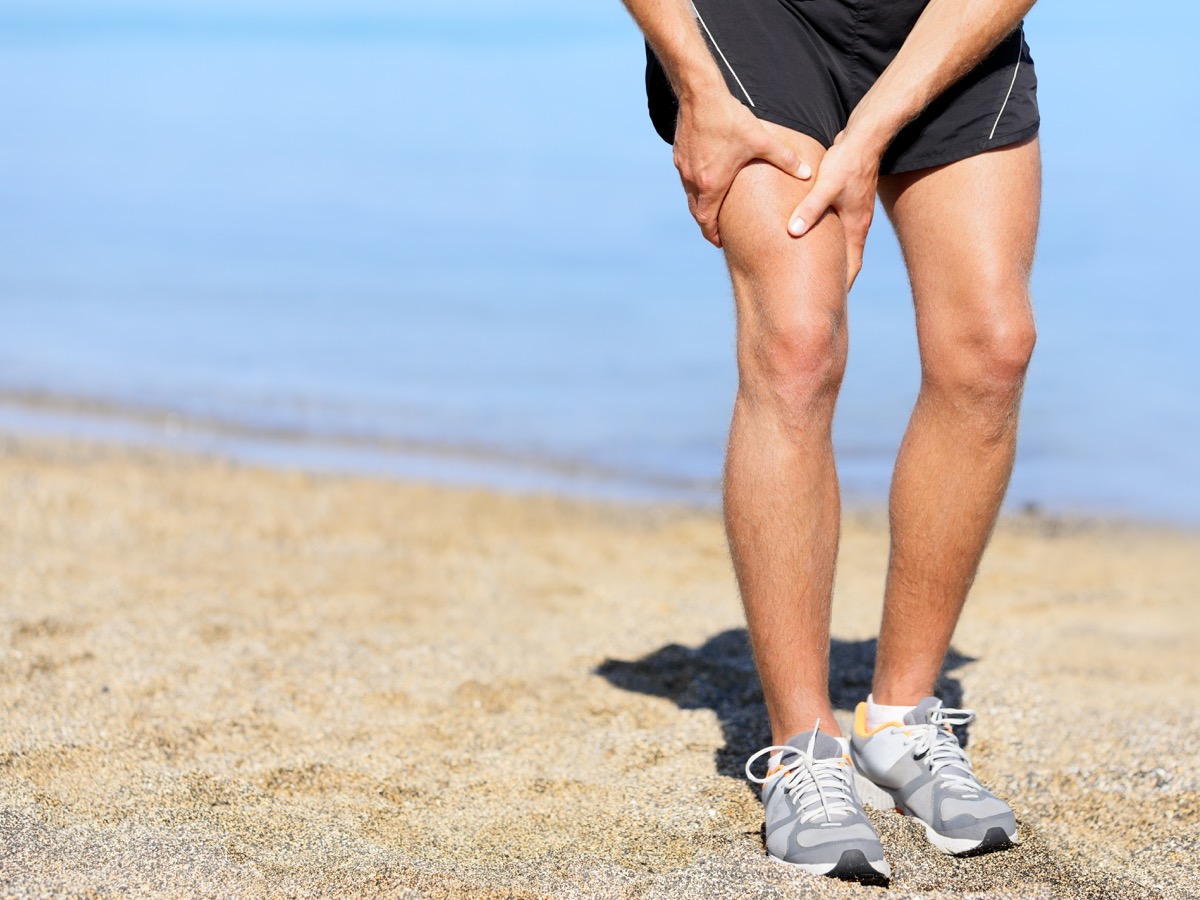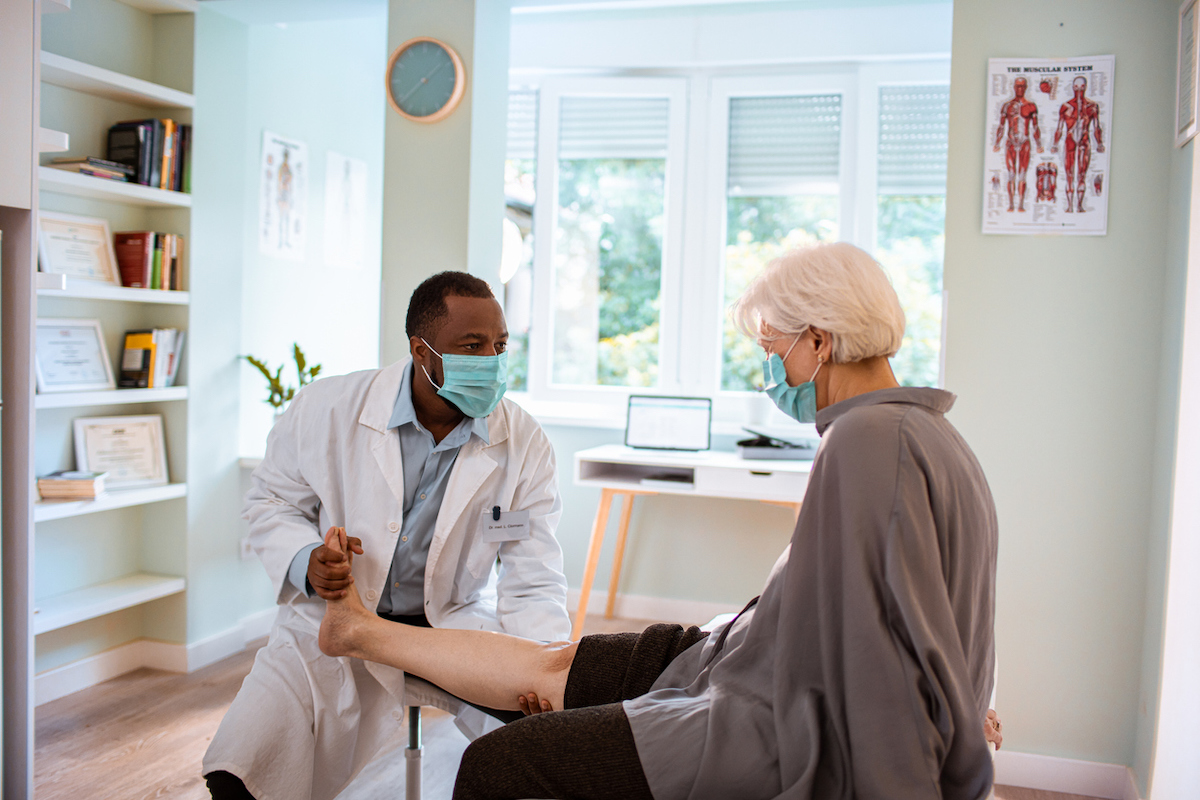From bestlifeonline.com
YOUR LEGS COULD BE TRYING TO TELL YOU SOMETHING ABOUT YOUR BACK
Sometimes muscular pain is just that—a strain or injury in the muscle at the site of your discomfort. But experts warn that certain sensations can actually transfer from one part of your body to another. In these cases, the pain you feel in one body part is actually trying to alert you to a problem elsewhere. Experts say this phenomenon often manifests in your thighs. If you notice an uncomfortable feeling there, it may be due to a subtle spinal injury traveling through the nerve network to your legs. Read on to find out which symptoms to watch for, and what to do if it happens to you.
If you feel pain or weakness in your thighs, get your spine checked

If you experience pain, weakness, tingling, or numbness in your thighs, experts say it could actually be coming from a herniated disk—also called a slipped or ruptured disk—in your lower back. Leg pain originating from this region of the back, known as the lumbar spine, is commonly referred to as sciatica. That's because the sensation travels from the back to the extremities via the sciatic nerve, the largest nerve in the human body.
You can have a herniated disk at any age, but most cases occur in people between the ages of 30 and 50. This means that if you experience thigh pain when you enter middle age, there's an increased likelihood that your back is actually to blame.
Herniated disks are more likely to occur in middle age

A herniated disk is a problem that can develop in the space between the spinal vertebrae. "It occurs when the jelly-like filling in a spinal disk —one of the pads between your vertebrae, or spinal bones—breaks through the disk's outer shell, called the annulus, and bulges through the tear," explains Harvard Health Publishing. "When this happens, the material may press on nearby nerves, which can cause a host of symptoms including inflammation, pain, and numbness." Though symptoms can occur in both sides of the body, they will more often occur in just one.
The Mayo Clinic notes that disk herniation is most frequently the result of disk degeneration—a normal and gradual result of getting older. "As people age, the disks become less flexible and more prone to tearing or rupturing with even a minor strain or twist."
Acute injuries can also cause a disk to become herniated, resulting in sudden pain. "Most people can't pinpoint the cause of their herniated disk. Sometimes, using the back muscles instead of the leg and thigh muscles to lift heavy objects can lead to a herniated disk, as can twisting and turning while lifting. Rarely, a traumatic event such as a fall or a blow to the back is the cause," the Mayo Clinic says.
Where you feel the pain can tell you which part of the spine is affected
Pain from a herniated disk is not necessarily limited to the thighs. Some people will experience pain or related symptoms in the arms, buttocks, calves, or even in the feet.
However, the Mayo Clinic points out that "a herniated disk, which can occur in any part of the spine, most often occurs in the lower back." This is significant because the location of your herniated disk can determine where you feel pain and weakness. "Where in your body you experience these symptoms depends on the location of the herniated disk," says Harvard Health. "For example, if the disk is in your neck, you may feel pain down your shoulder and into your arm. If the disk is lower in your back, it may irritate your sciatic nerve, which can cause pain that radiates through your buttock and down your leg."
Since herniation in the lower back is common, it makes sense that thigh pain frequently signifies a herniated disk.
Very often, the pain will resolve on its own

Thankfully, there's some good news if you notice signs of sciatic pain or a herniated disk. According to Harvard Health, roughly 90 percent of pain with this underlying cause will resolve without treatment within six months. In the meantime, your doctor may recommend over-the-counter pain medication to lessen your discomfort. They may also suggest limiting physical activities that seem to aggravate the injury.
If your pain does not notably improve within that time frame, your doctor may also recommend physical therapy. In rare cases, your doctor may discuss surgery, though this is "typically not recommended unless the problem does not respond to therapy, if you are having an increasingly hard time moving, or if your doctor believes the spinal cord is being compressed," says Harvard Health.
If you notice signs of a herniated disk, speak with your doctor to discuss the full range of treatment options available to you.
https://bestlifeonline.com/thighs-spine-herniated-disk-news/
No comments:
Post a Comment